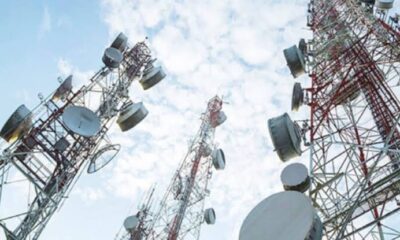Opinion
Inadequate power supplies for telecom services and others

By Sonny Aragba-Akpore.
By Wednesday December 11,2024 the National electricity grid had recorded 12 collapses within the year thus accounting for an average of one per month.
Apart from millions of customers whose homes and offices were cut off electricity supplies, many corporate organizations including telecommunications network providers, manufacturers among others had to cope with the situation making do with their more reliable alternatives which had become more regular than the national grid.
With a paltry 5,000 megawatts of electricity supply by the generating companies (gencos), for the nearly 250 million population, millions of people including corporate bodies have resigned to fate.
Resort to alternative sources of power supplies including renewable energy, solar and heavy duty generators have become a way of life.
Only recently, government officials announced that a tariff hike of upto 65% was underway,a situation the Manufacturing Association of Nigeria (MAN) frowns at saying this will further compound costs of doing business in general.
Director-General of MAN, Mr Segun Ajayi-Kadir, expressed serious concern in a statement issued in Lagos saying the frequent increases do not meet quality of service.
Ajayi-Kadir stressed that electricity is a crucial input in manufacturing, significantly affecting production costs and product prices.
He emphasised that no nation could achieve substantial industrial development without ensuring energy security.
According to him, any increase in tariff will harm the competitiveness of Nigerian products and businesses.
He warned that the such would worsen production costs, intensify inflationary pressure, and further reduce consumers’ disposable income.
Ajayi-Kadir added that it would increase manufacturers’ unsold inventory, erode profit margins, raise unemployment, and force more private businesses to shut down.
“It was due to the critical role of energy security in Nigeria’s industrial aspirations that the power sector was privatised in 2013. Unfortunately, this privatisation has not delivered the expected results.
But for telecommunications operators,it’s a tale of woes as power supplies account for about 40% of the operating expenditure (OPEX) as critical as equipment because even if equipment is available and no electricity supply to power them,quality of service suffers especially when there is down time.
Nigeria’s unstable electricity grid significantly contributes to telcos’ need for backup diesel generators, further increasing their energy expenses.
Recent reports indicate that Nigerian telecommunication companies (telcos) spend a significant amount on electricity, with estimates suggesting their monthly energy bill can reach up to N56 billion primarily due to reliance on diesel generators to power their network towers, as they often face unreliable grid access; many telcos are now actively exploring renewable energy options to reduce costs.
A major portion of telco electricity expenses is attributed to diesel consumption to power their base stations, with some reports stating that large operators like MTN can spend over N30 billion per month on diesel alone.
To mitigate high energy costs, many telcos are actively investigating and implementing renewable energy solutions like solar and wind power to reduce their reliance on diesel.
For telcos to be Successful and profitable there should be operational efficiency especially of the infrastructure companies or owned infrastructure.
About 40%, if not more , of the operational challenges of the infrastructure companies or operator owned and managed infrastructure is in the cost of energy : diesel or gas, or renewables.
Analysts reason that how the industry is able to survive the cost and access to energy supply, especially for the infracos in a safe and sustainable manner, is the solution that must be tackled in the long run for sustainability of the industry in its oprations, user experience and profitability.
One analyst said there are several generic intervention initiatives by government, local and foreign development agencies and financial institutions, including some commercial banks in the energy sector, especially aimed at promoting renewable energy supply and usage in support of the operational and cost efficiencies of the target sectors.
“These well-intentioned initiatives have been customised in some instances
such as the government policy of energy for the health sector (energise health) or energy for education (energise education) initiatives.”
“These commendable policies work to provide renewable energy solutions to institutions such as primary health centres, Universities, University Teaching Hospitals and Federal Medical Centres that are generally limited, discretionary, tied to yearly budgets of government, most times apply to federal institutions, and lack maintainance and sustainability instruments.”
Telecommunications sector contributes more than 15% to Nigeria’s GDP and is entirely private sector driven but has an impact on all growth and development direction of the country and because it is perceived as a private sector commercially profitable business there has never been any deliberate intervention to address the critical component of the cost and quality of energy supply to the sector.
Perhaps because of its ubiquitous nature and lack of knowledge of the structure of the sector, there was never an attempt to isolate and address this subject.
Yet the ability of the sector to continue its impact on national growth and development is tied to availability and affordability of energy sustainably.
The country’s telecoms sector, with around 154 mobile subscribers, needs a significant amount of energy. It relies on over 40 million litres of diesel per month, and 34,862 towers in 2022 were dependent on diesel generators due to unreliable grid power.
As more people come online, telcos need more power. Monthly internet usage increased by 579.39 percent from 125,149.86 terabytes (TB) in December 2019 to 850,249.09 TB in September 2024. The amount of energy needed to power data traffic is around 0.17 kWh globally.
However, GSMA noted that it is 0.24 kWh per GB, reflecting the lower energy efficiency of networks on the continent.
According to the Association of Licensed Telecommunications Operators of Nigeria (ALTON), diesel accounts for 35 percent of telecoms’ operating expenses. In October, the average cost of a litre of diesel was N1441.28, meaning telcos spent at least N57.65 billion.
As of the end of 2022, the Nigerian Communications Commission (NCC) said there were 34,862 towers and 127,294 base stations in the country. According to industry sources, each base station has two generators. The telecoms industry spent N2.09 trillion on operational costs in 2022, based on the last data uploaded by the NCC.
Gbenga Adebayo, Chairman of ALTON, confirmed the current diesel consumption, stating, “It will be over that now.” According to Harmanpreet Dhillon, Airtel Nigeria’s chief technical officer, the telco spent N28 billion on diesel in May 2024.
During a media roundtable, Dhillon said that the company was exploring hybrid solutions—lithium batteries and solar—to lower its energy bill.
Experts recently noted that companies could save up to 30 percent on energy costs by adopting renewable energy solutions and other technologies.
“The biggest constraint in the telecom industry is high energy cost. If the government had continued to fulfill its part of the bargain it made in the early 2,000s to provide 18 hours of electricity, the heavy logistics and the capital we spend today from powering sites would not be there,” said Adebayo of ALTON.
By January 13, 2025, Nigeria could boast of 23 power-generating plants that are connected to the national grid. These plants are known as generation companies (GenCos).
Some examples of GenCos in Nigeria include Egbin Power Plc: Located at Egbin Power Station, Egbin Town, Ikorodu, Lagos State
First Independent Power Limited: Located in Trans-Amadi Port-Harcourt, Afam, Omoku, and Eleme
Geregu Power Plc: Located on Itobe Ajaokuta expressway, Kogi State
Other power companies in Nigeria are Mainstream Energy Solutions Limited, Sapele Power Plc (SPP), and Transcorp Power Limited.
They are managed by the Transmission Company of Nigeria (TCN) a body responsible for managing the electricity transmission network in Nigeria. The TCN is fully owned and operated by the government.
In 2024, the power generation capacity in Nigeria was 5,528 megawatts (MW). This was an increase of 30% from the average generation capacity of 4,100 MW in 2023.
There are 11 distribution companies in Nigeria.These include Enugu Electricity Distribution Plc. (EEDC): One of the 11 distribution companies in Nigeria
Jos Electricity Distribution Company Plc: An indigenous electricity company that distributes and sells electricity ,
Kano Electricity Distribution Plc (KEDCO): A distribution company in the north-western geopolitical zone of Nigeria ,
Yola Electricity Distribution Company Plc (YEDC): A distribution company that supplies energy to Adamawa, Taraba, Borno, and Yobe states
BEDC Electricity PLC is a distribution company that supplies electricity to a wide range of customers in Southern Nigeria
These companies are supplied with electric energy by the transmission companies on a daily basis.
Opinion
RIVERS, WIKE, FUBARA, AND THE WAY FORWARD
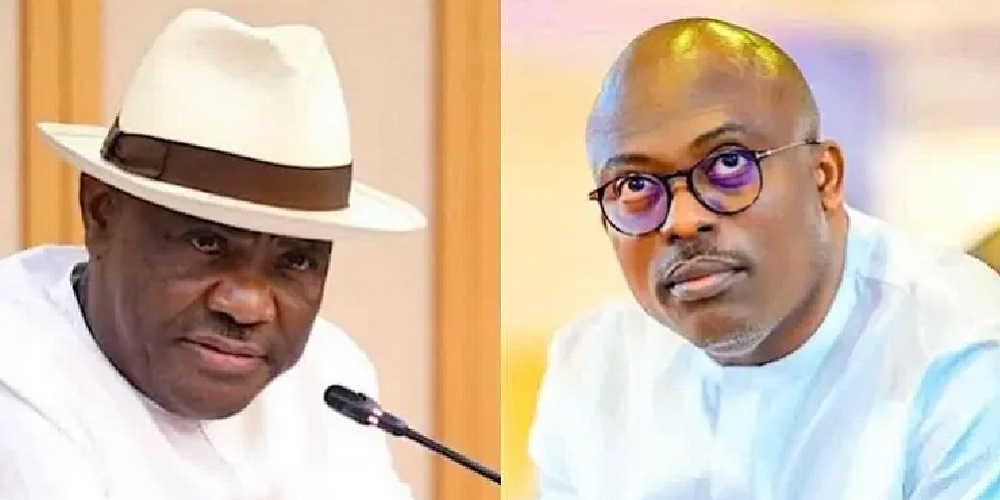
BY BOLAJI AFOLABI
It is no longer news that the seemingly “minor” disagreement between Sir Siminilaye Fubara, and Barrister Nyesom Wike, and by extension the Rivers state House of Assembly; which snowball into protracted quagmire, and multi-faceted crisis led to the declaration of state of emergency by President Bola Tinubu on March 18, 2025. Somehow, the power-tussle, and relevance-battle which grew in leaps and bounds threw up different names, and groups. Sadly, while development issues in Rivers suffered unnecessary, and unreasonable hiatus, many individuals masquerading as “analysts, commentators, and activists,” literally swarmed radio, and television stations pushing forward, with ecclesiastical posturing the positions they believed to be “facts.”
Perhaps, the pursuit of pecuniary benefits may have informed these actions, and attitudes by those who reportedly embarked on regular visitations to media houses in Lagos, Abuja, Port Harcourt, and other major cities across the country. Some of these “experts” became “merchants of propaganda” and “purveyors of falsehoods” while the beef festered. Determined to justify their pay, they dug in; harder, deeper, and ferociously. It is argued that the fire of confusion in Rivers dragged on, and refused to be extinguished as a result of the continued unfriendly comments, and unpeaceful antics of some of these financially-induced commentators, groups, and associations.
Like most things in Nigeria, many people joined the bandwagon; pontificating on issues they didn’t have full, and proper grasp. Some of these interventions ranged from the ludicrous to tongue foolery. Not mindful of the harm the continued schisms were having on the general well-being of the ordinary people on the streets of Rivers, these puppeteers evolved selfish ways in compounding matters, thereby ensuring that their unconscionable activities received regular patronage. Many of those who purportedly enjoyed the largesse included lawyers, politicians, and academics. Activists, women groups, youth associations, and others allegedly leveraged on the crisis for financial favours. Indeed, professional bootlickers, crisis-manipulators, and mudslinging “careerists” coalesce to have their bites, and share of the enticing cake from the “treasure base” state.
Between the time the crisis became public in the last quarter of 2023, and when Tinubu declared a state of emergency, the writer refused to comment on the issue. Save for an opinion published December, 25, 2023, a siddon look approach was taken. Comments raised therein that have been justified will be looked at in the course of this treatise. Any critical follower of Nigeria’s political history who is imbued with discerning gifts will not be surprised about the turn of events in the state. The unfolding developments were easily predictable by any unattached, and unbiased mind. With all modesty, having had consistent official and personal interactions with the political class, the writer can be credited with some measure of exactness, and appropriateness on certain matters bothering on power struggle, influence-relevance, structures realignment, and political control.
In over two decades of closely monitoring Nigeria’s political development, and the political class, there are many lessons learnt which has enriched one’s knowledge, and broaden understanding. Yes, democracy is practiced in Nigeria. However, certain situations clearly suggests that our variant of democracy is unique, different in many ways. What may be practicable in some other countries can be an aberration in Nigeria. Issues like loyalty, group interest, party structures, positions and projects sharing, and similar others are not, never toyed with. In most cases, political office holders dissipate energies, time, and resources in maintaining the status quo towards being in the good book of those that matters. Everything is deployed in achieving this purpose. However, anybody that steps out of the line, particularly for perceived arrogance, and selfish agenda, the outcomes may not be palatable.
The Rivers crisis is a perfect example of these issues. As the dispute gained momentum, and became the major topic of discourse across the country for months, some dispassionate observers postulated that the final outcome may become tasteless in the mouths of certain people. The writer in an earlier commentary, “RESCUING FUBARA FROM IMMINENT POLITICAL DESCENT” published on 25th December, 2023 wrote that, “Governor Sim Fubara, being a political-starter may not be discerning enough to know that those encouraging him to take rigid positions and rudderless actions are only digging his “political grave.” How do one explain a Governor carrying out actions that are purely undemocratic? Closure of the Assembly Chambers; allegedly demolishing the Assembly Complex; presenting the state’s Budget to a “3-man Assembly” and some other constitutional infractions.”
Continuing, the writer declared that, “somebody must strongly advise Fubara that if actions that may throw the state into further tensions continue, it would not be out of place if the Federal Government declares “state of emergency” in Rivers. Recall that a similar thing happened in Oyo and Plateau states during Obasanjo’s administration. If protests and other activities persist, and the Wike group of “27 majority lawmakers” insists on doing the right thing, or the Federal Government takes necessary steps, Fubara will be the greatest loser. Either impeachment or a state of emergency, NONE will favour him. If this happens, Fubara may just discover that his group of friends, loyalists, and associates would abandon him. Typical of politicians, these “yes-men” will not only leave him to groan over his predicament but likely jump ship by shifting their “loyalty” to the other group. Fubara should meditate on this age-long aphorism that, the umbrella becomes a burden once the rain is over; that is how loyalty (the feigned and contrived one) functions when benefits stop.”
Back to now. Though there are on-going lawsuits, initiated by different blocs including the Peoples Democratic Party, (PDP) Governors Forum to reverse the presidential declaration but until the Supreme Court pronounces otherwise, the state of emergency subsists. Days into the “emergency state” certain comments credited to Fubara were encouraging. At various times, he alluded to the fact that no sacrifice is too big for the peace of Rivers. However, recent developments give concerns, and worries about the likelihood of ending or extending the “emergency state.” From reports, there seems to be an upsurge in rallies, walks, and demonstrations against Naval Vice Admiral Ibok-Ete Ekwe Ibas (Rtd), Rivers state Sole Administrator. At many of the protests, the call for the return of Fubara; to the office has been loud and clear. There are no pretences about the demand.
Yes, the supporters, loyalists, and associates of Fubara have the constitutional rights to legitimately press for his return to the classy, comforts of the “Brick House” moniker for the Government House. Some people who are non-aligned in the Rivers crisis are worried about the timing, messaging, and mission of these actions. Meanwhile, the rumour mill is agog about Fubara’s alleged endorsement of these protests. Many dispassionate observers concerned about this trend, are asking questions. Why has Fubara not called these groups to order? Why have his senior aides not issued statements to disassociate him from the allegations? Of what use are these activities amid certain reconciliatory talks?
Given the strategic position of Rivers to national development, most Nigerians are seriously concerned about the unpleasant news coming from the state. As the second largest revenue generating state, after Lagos there is an urgent need for permanent resolution of the crisis, towards engendering growth and development. If media reports about Fubara’s reconciliation drive are true, many people will be happy. However, as advised in the earlier article, “Fubara should realize that some Elders and Leaders who are now his “political advisers” have other reasons for supporting him. Their loyalty and support is not driven by love for him but some other extraneous reasons. Hence they keep exerting pressure on him to renege on the “Abuja Agreement.” One does not need to be Nostradamus to postulate that some of these people may have begun shadowy moves to truncate the reconciliatory moves. One hopes that Fubara will, this time; ‘borrow himself proper brain’ as they say on the streets. Perhaps, he should talk to himself; being Governor of the oil-rich state ‘is no beans, something he got on a platter of gold, amid many other aspirants with better political capacities and public service credentials.
Indeed, for the supporters of Fubara to eventually witness the return of their person to office, they must wholeheartedly urge him to “own” the process. Just as he is the greatest loser of the “emergency rule,’ he stands to be the major beneficiary when proper reconciliation is achieved. As stated in the earlier treatise, “for once, Fubara should put on his ‘thinking cap’ and be truthful to his conscience by ……………….. ensuring irrevocable reconciliation with Wike. Fact is, the Ikwerre-born political tactician whom Fubara fondly calls ‘my Oga’ is the only Leader that is fully committed to his success and political growth. Not the retinue of his vicious, selfish, and wicked new-lovers who will evaporate when the table turns. Fubara should be sober and sombre by going back to his political roots.” This position was canvassed about two years ago and stands valid. From observations and analysis of his personae, Wike looks more like someone that has meekness, fairness, and empathy. Though perceived as arrogant, and haughty by some people but beneath may be a soft, considerate, and accommodating mind. Fubara should imbibe the spirit and letters of the saying, “stoop to conquer,” and come down from his high horse, as well as stop dancing to the quarrelsome drums of his coterie of “deceivers.” On his part, Wike, who has shown, and further consolidated his coveted status as the “grandmaster” of Rivers politics, should embrace the teachings, and lessons of the Biblical “prodigal son” by not only forgiving but accepting Fubara back to the political family; where he truly belongs.
* BOLAJI AFOLABI, a Development Communications specialist, was with the Office of Public Affairs, The Presidency, Abuja.
Opinion
CBN 2024 financial performance an indicator Cardoso’s twerking yielding results

By Dr. Ibrahim Modibbo
The Central Bank of Nigeria (CBN) under the able leadership of Governor Yemi Cardoso has released the apex bank’s 2024 financial statements. The results reflect the bank’s commitment to economic stability, sound policy implementation, and strategic financial management. The financial performance further highlights improvements in external reserves, asset quality, cost efficiency and overall bottom-line improvement.
An indicator of Cardoso’s policy direction being on the right track is manifested by the CBN posting in its latest financial statement showing the country’s external reserves growing from $36.6billion in 2023 to $38.8billion in 2024.
This is phenomenal achievement is largely attributable to the apex bank’s improvement in accretion to external reserves from portfolio investors, diaspora remittances and the federal government receipts following improved confidence in the Nigerian economy, facilitated by better coordination with the Nigerian National Petroleum Company (NNPC) and diaspora engagement strategies.
Another contributory factor is the proper investment management decisions taking by the CBN governor, aimed at boosting the reserves of the bank. This glowing performance reflects the CBN’s firm commitment to external sector stability, ensuring Nigeria is better positioned to meet its international obligations, stabilize the naira, and boost macroeconomic confidence.
Remarkably, the CBN fianancial statement also showed that the bank’s bottom-line improved from a deficit position of ₦1.3trillion in 2023 to a surplus of ₦165billon in 2024. This turnaround is attributable to a direct consequence of apex bank’s effective containment of expenditure, gains on investments made by the bank and increased income from foreign exchange transactions under the Cardoso regime.
The financial statement further showed a notable reduction in loans and receivables from ₦16.1trillion to ₦11.9trillion, due primarily to significant recoveries from earlier intervention lending programmes; a deliberate policy shift away from previous intervention lending and monetary financing through ways and means in line with the bank’s new stance on allowing market mechanisms to drive credit allocation and financial sector development.
To reflect Cardoso’s enthroning of a cost-conscious culture at the CBN, the apex bank adopted a strategy of optimizing and streamlining it’s operating expenses in 2024, through strategic cost rationalization initiatives, including reduction in non-essential spending and streamlined operations across regional branches and departments.
Furthermore, in line with the Financial Reporting Council (FRC) regulatory requirement on ICFR, it is worthy to note that the Central Bank was able to carry out an assessment of its internal controls which was further certified effective by the joint external audit team. This approach resulted in enhanced transparency and accountability in financial reporting, strengthening institutional governance and internal risk controls, and aligning with international best practices in central bank operations
As a testament to the effectiveness of this initiative, the joint external auditors issued an independent assurance report declaring the CBN’s ICFR framework to be “effective” for the 2024 reporting period. However, it wasn’t all cheering news all the way because while the Central Bank of Nigeria’s 2024 financial results reflect operational improvements, some expenditure lines posed challenges.
One of the notable upticks in the apex bank’s expenses in 2024 was related to liquidity management operations. These costs rose to ₦4.5trillion from ₦1.5trillion in 2023. This increase can be traceable to the tightening monetary policy stance adopted by the CBN governor to combat inflationary pressures throughout the year.
In pursuit of that objective, the CBN conducted more frequent and higher-value Open Market Operations (OMO) to mop up excess liquidity arising from fiscal injections at a significant cost. This is a huge responsibility CBN is carrying out on behalf of the federation, whereas in some jurisdictions, this cost is borne by the government.
The financial statements also reflect an increase in the loss on settled derivative contracts during the year from ₦6.3trillion in 2023 to ₦13.9trillion in 2024. This development is a direct consequence of the high volume of derivative contracts settled by the apex bank in 2024. These are legacy transactions which the Cardoso management met on resumption of office.
This proactive settlement effort was undertaken as part of management’s broader strategy to reduce outstanding foreign exchange liabilities, thus lowering its FX exposure, boost net foreign reserves, thereby improving Nigeria’s external buffer and investor confidence, restoring credibility to Nigeria’s forward markets and address legacy obligations transparently.
It can be said that the improved performance of the Central Bank of Nigeria in 2024 is not coincidental but a product of deliberate, and strategic management efforts undertaken by Governor Cardoso. The bank’s leadership has reinforced governance and accountability, instilling operational discipline in the running of the CBN. It has also pursued a balanced monetary policy stance, ensuring price and financial system stability.
These reforms enunciated by Governor Cardoso since his appointment by President Bola Tinubu have collectively repositioned the CBN as a credible monetary authority, with its 2024 financial results serving as proof of its unwavering resolve to support the economic recovery programme of the current administration, safeguard financial stability, and build public trust.
Dr. Ibrahim Modibbo is a public affairs analyst and writes from Abuja.
Opinion
Olorunyomi, Nigeria’s most decorated journalist, takes another award

By Omoniyi Ibietan
For the umpteenth time, Oyekunle Oyedapo Olorunyomi, publisher of Premium Times, possibly contemporary Nigeria’s most honoured journalist, was garlanded earlier today, with the Hallmarks of Labour Foundation (HLF) Award.
Olorunyomi, popularly called Dapsy, famous for his public spiritedness, brilliance, grit and vision, and particularly renowned for his pragmatism and love for investigative and interpretive reporting, media independence, accountability as well as advocacy for public interest journalism, in his words ‘journalism of relevance’, received the HLF-Christopher Kolade Award for Excellence in Leadership and Professionalism in the Media at an event in Lagos.
Reckoning Dapo Olorunyomi’s journalistic antecedents and the trailblazing Premium Times Media Group – which houses the Premium Times newspaper (an online newspaper), Dubawa (a fact-checking entity), the Centre for Journalism Innovation and Development (a tech-oriented knowledge production centre instituted to empower and support African media), and Premium Times Books (a book publishing arm) – the Hallmarks Foundation found a repository to draw form and content that gave expression to professionalism and leadership.
As captured by Premium Times, this award celebrates Dapsy’s “established track record” in championing media independence, accountability journalism, and ethical standards.
An incurable believer in the promise of newspapering for the promotion of freedom and democracy, a leading light of avant garde, innovative journalism in the service of society, iconoclastic and radical, I first took note of Dapsy as a social actor in the Nigerian space after reading the cover story of the African Concord newsmagazine titled, “Has IBB Given up?” an exceptionally objective unsparing analysis of the Babangida regime. The publication’s factuality and poignancy was so stinging as to precipitate the sealing of the premises of the medium for six months and its proscription in 1992 by the military regime.
Unbeknownst to me, Dapsy and I have a deeper historical connection. For instance, he was in the league of student leaders of the early 1980s who pitched their tent in the left pole of the ideological spectrum. It was he and his comrades who drafted the Charter of Demands of the National Association of Nigerian Students (NANS), a document that would become a consequential duty of my generation of student leaders to implement.
Born in Kano, educated at Ife, Oxford, Washington and across the world, ever since Dapsy enrolled at the then University of Ife where he obtained a bachelor’s degree in English and a Master’s in Literature, he has been on the famished road of knowledge production, journalistic rectitude, organised, conscious self and collaborative activities of social action and uncommon charity. As a student at Ife, he spent his holidays working PRO BONO as a press officer at the South Africa’s African National Congress Office in Lagos, and he continued to live a life marked by ecumenism and charitableness.
Exactly two years ago, precisely on January 11, 2023, I published a tribute to honour him when he was announced the first African fellow of the Poynter Institute, alongside 26 other global media entrepreneurs and actors for the 2023 Media Transformation Challenge (MTC) programme. The Poynter Fellowship had recorded 350 alumni as of 2023, and Dapsy broke the jinx by becoming Africa’s first alumnus.
In 2020, the International Press Freedom Award was presented to him. Earlier, in 1995, the World Press Review garlanded him as the International Editor of the Year. In 1996 he was awarded the Freedom to Write Award by the PEN Center, as well as Press Freedom Award by the National Association of Black Journalists in New York. For his involvement in reporting on the Panama Papers, he won a joint Pulitzer Award in 2016. The Global Investigative Journalism Network also honoured him with the Global Shining Award in 2017. Still in 2017, he carted away both the Nigeria Union of Journalists (NUJ) Press Freedom Award and the a distinguishing fellowship of the Nigerian Institute of Journalism (NIJ). Olorunyomi equally received the Diamond Awards for Media Excellence’s Lifetime Award.
He had worked for The Herald newspapers, was an editor at Radio Nigeria, African Guardian, and the African Concord before co-founding TheNews magazine, Tempo, as well as AM and PM News. He became the Enterprise Editor and head of investigation at the Timbuktu Media, publishers of 234Next. Olorunyomi has served on the board of many international organisations including Panos Institute West Africa, Norbert Zongo Cell for Investigative Journalism (a United Nations initiative) and he continued to serve on the jury or as chair or African analyst for many media initiatives or country surveys.
He was the Director Nigeria Project for Freedom House (FH), during which I worked with him as FH’s Regional Media Researcher for the Niger Delta. Freedom House is America’s oldest NGO focused on curating the state of press freedom in over 190 nations and territories. While at FH, he founded the Wole Soyinka Centre for Investigative Journalism (now Wole Soyinka Centre for Investigative Journalism). He was Director for Policy and Chief of Staff to Mallam Nuhu Ribadu, when the latter was Executive Chairman of the Economic and Financial Crimes Commission. It was he who essentially developed crime prevention and education policy at EFCC.
He was on exile for a while when the Abacha regime launched a serial crackdown on activists and journalists. He returned to Nigeria at the onset of Nigeria’s renascent democracy and continued his works without ceasing as a dedicated Nigerian patriot. In 2021, he was arrested ostensibly for publishing a libellous story about former Army Chief Buratai, an incident that suffered a natural fate as cases of unsubstantiated allegations.
The Development Agenda for Western Nigeria (DAWN) Commission aptly described Olorunyomi as ‘Akinkanju’ (the Valiant man) of Nigerian journalism. His story continues to serve as an unvarnished reminder of the value of focus, love for man and country, determination, selflessness, and living for others.
Dr. Omoniyi Ibietan is the Head of Media Relations, Nigerian Communications Commission (NCC).
-
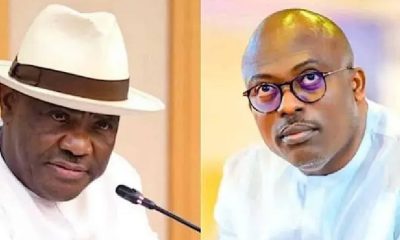
 Opinion16 hours ago
Opinion16 hours agoRIVERS, WIKE, FUBARA, AND THE WAY FORWARD
-

 Politics15 hours ago
Politics15 hours agoJust in: Delta PDP Reps members defect to APC
-

 News20 hours ago
News20 hours agoVDM may be released on Tuesday
-
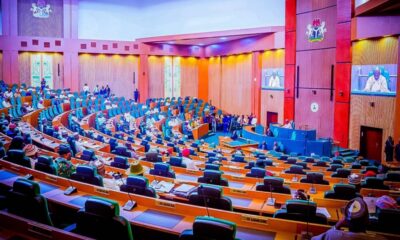
 News14 hours ago
News14 hours agoTension As Lawmakers Warns of Public Revolt Over Insecurity
-

 News17 hours ago
News17 hours agoNANS Barricades Lagos-Ibadan Expressway Over Alleged NELFUND Mismanagement
-

 News17 hours ago
News17 hours agoCourt bans Nnamdi Kanu’s in-law from 3 proceedings over live streaming
-
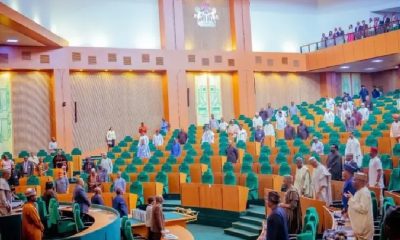
 News13 hours ago
News13 hours agoRep Raises Alarm After Deadly Attacks In Borno, Says Boko Haram Is Returning Stronger
-

 News12 hours ago
News12 hours agoEdo Speaker, Two Other Lawmakers, Formally Join APC


